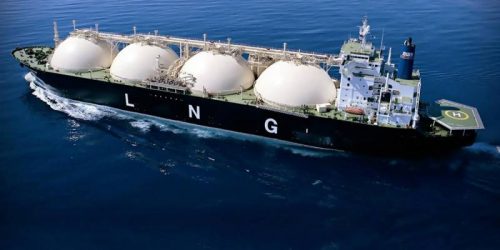ISLAMABAD: The Petroleum Division (PD) on Thursday said the government had procured 41 spot liquefied natural gas (LNG) cargoes, during the last 27 months, on average of below 12 percent Brent that helped save $237 million.
The PD shared these details in a press statement after some media reports alleged mismanagement in the spot buying, terming them “based on false assumptions and incomplete facts.”
The PD said the first query, in the media reports, pertained to the LNG procurement to run both terminals in full capacity and import of six cargoes in December.
“It must be understood that the two terminals together have operated on 65 percent or less capacity in nine months out of last 27 months. Another factor which must not be ignored is that the previous government had signed long-term contracts for 800mmcfd (million cubic feet per day) for supply of LNG.” Unless this was sold first, it said, buying more was not possible, even if it was available at cheap rate.
The previous government also signed 1,200mmcfd of terminal capacity on a ‘take or pay’ basis which resulted in $527,000 per day payment, regardless of the level of use of these terminals.
“The current government purchased 41 spot LNG cargoes on much less average for the whole year than term slope of 13.37 percent Brent, which enabled us to save $237 million in last 27 months,” it added.
“Also, once you award a cargo, which has a fixed delivery date, it is near impossible to move it, especially in winter peak. Hence, if you do partial ordering of spot cargoes, you may not be able to slot more cargoes later, because that results in change of delivery date of all cargoes.”
Secondly, the PD said, it was being asked why the government invited tenders for December in November. “This is factually incorrect. Pakistan LNG Ltd. placed tender notice for six LNG spot cargoes for use of December on October 02, 2020.”
Third question, it said, was related to forward purchasing in summer for winter delivery when global market prices were down due to less demand in summer.
“It must be understood that spot cargoes are generally for ready delivery (i.e. within 30-60 days). While you can do forward buying (i.e. order today for delivery many months later), the pricing for such purchases is done on a forward curve for Brent and swap spreads for slope.”
So, if spot cargoes were available in July for 10 percent of the Brent, “resulting in say $4/mmbtu delivered price, an order placed in July for delivery in December does not get priced at $4/mmbtu.”
The sellers would use forward projections of the Brent in December and “Swaps spreads for slope in December, resulting in a much higher price for delivery in December.”
It said, “An expectation that we can get ready price of summer for delayed delivery in winter, assumes that the sellers are so naive, and we as buyers are so smart, that we can take advantage of them. This simply shows lack of understanding of how forward market works.”
“As an example, the JKM swaps on Oct 02, 2020 for December delivery were $5.5/mmbtu. The same JKM swaps for December delivery in mid August were $5.4/mmbtu, a bare 10 cent difference. So even if the December tender were issued in mid August, the price would have been effectively the same.”
Fourth question, the PD said, was based on comparison between Pakistan and India on spot purchasing of LNG claiming that India saved billions of rupees by placing orders for November three weeks before Pakistan.
“Again this is factually incorrect. Pakistan placed tender for November delivery on Sept 09 and Sept 15 with the PPRA compliant mandatory 30 days. India placed a one day tender on Sept 29 and awarded on Sept 30. The price of this one cargo was $0.98/mmbtu less, as reported by Bloomberg, than the November average of Pakistan. Many major suppliers like Vitol and Trafigura have bought December cargoes at prices higher than Pakistan as reported by Bloomberg. Are they all incompetent? Single cargoes cannot be compared because they depend on the day of award and conditions of tender.”
For example, the PD said, Pakistan LNG Limited (PLL) required 21 days credit period and 10 percent of performance guarantee on LNG supplies. “Also our port cargoes are 400 percent higher. India does not have these conditions. An example of the reverse situation was PLL spot cargo of July 27, 2020 at price of $2.2 but Reliance, India awarded a cargo only three days later on July 30, at $2.7, a full 20 percent higher.”
Unfortunately, the PD said, some media persons claimed that the spot buying this year had caused Rs122 billion loss to the exchequer.
“The total of all cargoes bought in 2020 on spot was $353 million, or Rs 57 billion, with an average just below 12 percent. So, it is illogical to say that when money spent is Rs57 billion, somehow a loss of Rs122 billion has been created.” Even if compared to contract deliveries, the spot purchases, including higher December numbers, the Petroleum Division said, it was still cheaper.
“The public discourse needs to move to planning and implementation on legal reforms to declare LNG as gas, from the deliberate distortion created by the last government declaring it petrol,” the PD statement concluded.





